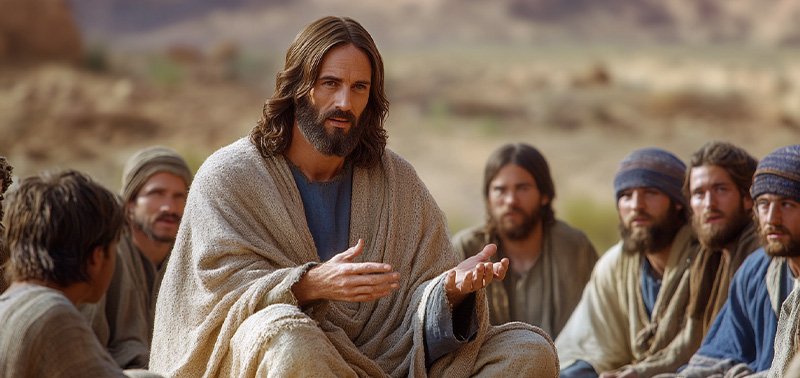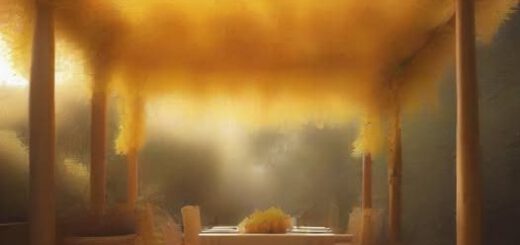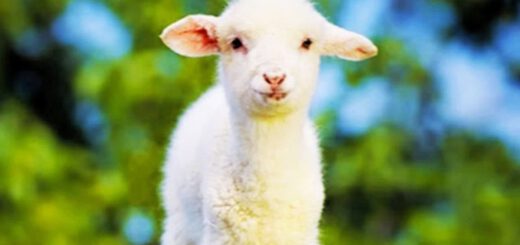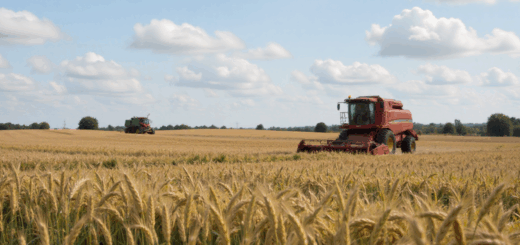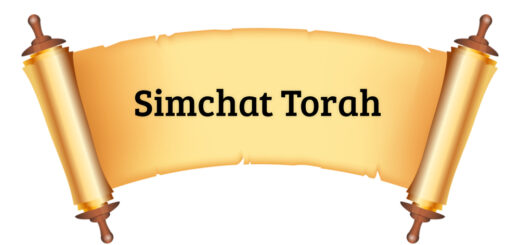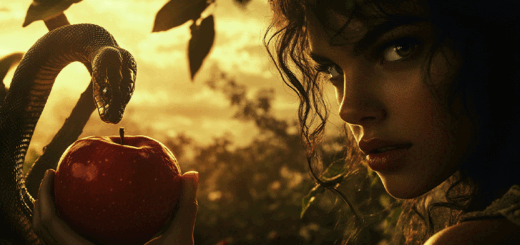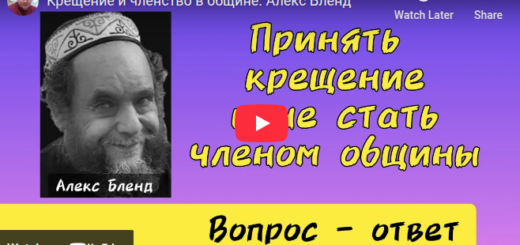What Does It Mean to Be in Mashiach?
Shalom, dear friends! This is Alexander Blend with you once again.
I was asked to answer a very important question: What does it mean to be in Mashiach?
In Paul’s letters, we often come across expressions like “in Christ”, “I am in Christ”, “I can do all things through Christ who strengthens me,” and so on. Naturally, when we see a phrase repeated so often, we want to understand what it means, especially when it speaks about something quite practical.
To answer this question, we have to go back to the beginning, literally to the very beginning, to the first chapter of the book of Bereshit, where the Most High creates man. And for man to become a living soul, the Most High breathes into him the breath of life. Now, in order to breathe something into someone, one must first breathe it out from within oneself, and so the Most High breathed into Adam, the first man, a part of His essence.
So, in Adam, the earthly and the heavenly were united. Adam belonged to both the earthly and the heavenly realms at the same time—just like a bridge that connects the right and left banks of a river belongs to both. A bridge can’t fully belong to either bank because its entire purpose is to connect them. It’s neither on one bank nor on the other. Strictly speaking, Adam wasn’t just a man—he embodied the interpenetration of God and man.
But then, as we know, a very sad event took place—the fall. Adam was told: “You are dust and to dust you shall return.” His spiritual part was lost, and only dust remained. We might say that the vessel that had once been filled with the Divine, was now empty. And yet, because it was no ordinary vessel—it had consciousness—it retained a memory of how good it was to be filled with the Divine. And it is this very memory that drives man to seek the Most High, to search for the fullness he once had.
We know that because of Adam’s fall, the earth, from which he was formed, was cursed. But… if we read carefully, we’ll see that during the time of Noah and after the flood, this curse was lifted. In the first chapter of Bereshit, in the weekly portion Bereshit, when God placed the curse on the earth, it is said that man would toil for his bread in sorrow—be’etzev, and it is also said of the woman that she would give birth be’etzev—in sadness. And we see that when Noah is born… there is a prophecy in his name: he was called Noach, or “comforter,” because he would deliver us from this sorrow—”from the toil of our hands from the ground, which the Lord has cursed,” that is, from the very sorrow that was part of the curse of the earth. From that moment, with Noah—the tenth generation after Adam—the process of restoration from the fall began.
Then, another ten generations passed before Abraham appeared. About Noah, it is said that he walked with God (Noach hithalekh et Adonai), but about Abraham it can be said that he walked before God. In a way, Abraham was the first to proclaim that man must be one with God. Unlike Noah, who built the ark but did not call the nations to teshuvah —to repentance—Abraham became the first preacher of the Most High. From Abraham came a people, Israel, who were called to be heralds of the Most High. This was the first people whose ‘vessels’ were prepared at Mount Sinai to once again contain the Divine Spirit. It is said of them, “You are gods, and all of you are sons of the Most High.” According to tradition, the Most High Himself spoke these words at Mount Sinai.
Then, as we know, to great sorrow, the people made the golden calf… were tempted, and fell again, just as the psalm foretold. And yet, their mission was not taken away. They remained servants of the Most High. And then, after a long time, Yeshua came.
It’s helpful to compare two figures—the figure of Moshe and the figure of Mashiach, to see how they are similar and different. Like Moshe, Mashiach is the leader of the people. However, Moshe led the people through the wilderness. The wilderness has a unique characteristic: it is difficult for a person to survive in it. One constantly depends on manna from heaven; one constantly depends on a community. It could be said that the acceptance of the commandments in the wilderness was not entirely voluntary. This is also noted by the sages. The Talmud describes it as if the Most High held Mount Sinai over the people saying, “If you do not accept [the commandments], I will drop it on you.” Indeed, where could the people have gone in the wilderness, when it stretched around them for a journey of 40 days? How could they have rebelled against the Most High? Their very sustenance depended on Moshe, on their obedience to him. This is how the Most High had arranged it. That’s why it is said that they believed in Moshe… in God and in Moshe, His servant. Their faith in God, devotion to Him, was realized through their submission to Moshe. These words can be translated as “they believed in God and in Moshe, His servant.” All the people submitted to the will of Moshe. And, as tradition puts it figuratively, the first Adam united within himself the souls of all humanity, and Moshe united within himself the souls of all Israel. The Torah describes the people as b’lev echad —of one heart. And in Scripture, the heart is a thinking organ. They all followed Moshe with one heart.
But then, when the people finally entered the land of Israel, just when you’d think Moshe would be building a triumphal arch in Jericho and marching through it—if not riding a white donkey or at least walking in on foot—the Most High didn’t allow him enter Israel at all. [Why?] Because Moshe’s personality was uniquely suited to leading the people in the wilderness, [when they were] in a state of hopelessness, when they had no way out. But once the people entered the land where, according to the design of the Most High, each person could live freely—or at least, seemingly freely—growing crops, fishing, and hunting, [when] the hopelessness of the wilderness was no more, there, in this free land, Moshe could no longer lead the people.
Mashiach, on the other hand, has a completely different soul makeup. Paul repeatedly calls him “the new Adam.” Just as in Adam all died, in Mashiach all were made alive. This is because Mashiach has a unique gift from the Most High: in Him, the very spirit, the very breath of the Most High that was in Adam has been restored. He once again, like a bridge, connects the Divine and the human.
And when we stand on this bridge, we can go up and come back down. Do you remember when Yeshua said, “He will come in and go out and find pasture?” What was he saying? He was saying that we can enter the heavenly, just as Moses ascended to receive the Torah, and then come back down and see the pasture—the flock and the field where, figuratively speaking, people, like sheep, are brought to graze.
If you remember, Moses also said, “I am now old; I can no longer come in and go out, for I am 120 years old.” Yet we know from Scripture that Moses had not weakened or lost his vision. He is saying that he is approaching a new reality—one in which he will no longer be able to lead the people in a situation that has been made new for them. It is Yeshua the Mashiach [who is able to lead] as the new man in whom all the fullness of the Deity dwells in bodily form.
What does this mean? It doesn’t mean that he is a Deity or that some kind of Deity is within him. Rather, it means that the very breath of the Most High filled Him completely. You know how an inflatable toy can be just a little filled or fully and tightly inflated? Well, Yeshua was completely filled with the Divine Spirit. That’s why he says, “Whoever has seen me, has seen the Father.”
And this applies not only to Yeshua. It should apply to each of us. The task of any believer in Yeshua is to be filled with that same breath, the Spirit of the Most High, to unite once again into the single soul that was in Adam and that was restored in the new Adam—in Yeshua the Mashiach, and to become a bridge between the Most High and the earth, between the heavenly and the earthly.
We know that some creatures have only an earthly nature: turtles, rabbits… and all living things, except for humans. And we also know that there are heavenly beings: angels, archangels, cherubim, and a whole host of others. Quite a menagerie, really. But only Adam has the ability to build this bridge. And this Adam has been reborn in Yeshua the Mashiach, and through Yeshua, each of us is given the same ability to build that bridge, no longer with the Temple as the center [of Divine presence]—because we ourselves have become a temple.
And what is a temple? It is a place where the Most High dwells. So, what does it mean for us to enter the body of Yeshua? How can I know if I am truly in Yeshua? To answer that, I have to examine my will and my purity. We enter the world where there’s no impurity, where there’s no darkness. And if we still find darkness within us, it means we haven’t yet fully drawn close to Yeshua. Our bridge is still shaky. And our task is to strengthen it.
So, how do we do it? Paul says about this: “If you die with Mashiach…” Dying with Mashiach means putting to death my old self. And this is what is meant by “the punishment for sin is death.” But since we die with faith in a reborn new man—with faith in the design of the Most High to restore man—we are resurrected by the same spirit that raised Yeshua from the dead, that is, by the breath of the Most High within us.
And the more we decrease, the more this inner essence of the Most High, which He breathes into us, increases. And that’s what it means “to be in Yeshua” or, in Christian terms, “to be in Christ.” Without this, there’s no point in calling ourselves Christians, Messianics, or believers at all. No reasoning, no knowledge, no Jewish terminology will bring us closer to Mashiach without this practice—the practice of dying.
This was Alexander Blend. Thank you for listening.
